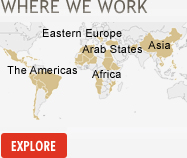

Monitoring & Evaluation
As a results-oriented cooperation mechanism, our focus was on delivering results that positively impacted citizens and institutions. This went hand-in-hand with our emphasis on mutual accountability of and towards all partners, and was backed by a rigorous monitoring and evaluation system which helped us to learn and improve decision making.
Monitoring and Evaluation (M&E) identifies trends, measures changes and captures knowledge to improve programmmes’ performance and increase transparency. We gave priority to management for development results, and engaged in a continuous monitoring and evaluation process that provided feedback to programme interventions and contributed to knowledge creation and management. The aim was to assess effects and progress in terms of advances towards the generation of public policies and improvements in people’s livelihood, focusing on programme outcomes and not just activities.
All joint programmes were responsible for designing their own M&E framework, including quantitative and qualitative baseline indicators, and for ensuring that a final evaluation of the joint programme was undertaken.
In addition, the MDG-F Secretariat established an M&E strategy with key indicators that allowed us to obtain a comprehensive overview of the MDG-F. The main elements of this strategy consisted of:
- Joint programme biannual monitoring reports that provided information against a set of indicators relevant to specific programme areas, collaborative “ONE UN” efforts and on development effectiveness as seen in the Paris Declaration. Upon completion of the MDG-F's Joint Programmes, 8 Development Results Reports were produced, presenting accumulated quantitative indicators and results achieved in each thematic window. Prepared by the MDG-F Secretariat, these reports were based on information from UN country offices and joint programme evaluations and reports.
- Mid-term (formative) evaluations of all 130 joint programmes which aimed to improve programmes during their implementation period.
- Final evaluations upon completion of each of the (130) JP, which assessed the final performance of the Programme.
- Final narrative reports on our 130 Joint Programmes, assessing results against expected outcomes and outputs and gathering best practices and important lessons learned.
- 10 country evaluations consisting of an in-depth and detailed evaluation exercise, using a participatory case study methodology focusing on MDGs advances, One UN efforts and the implementation of the Paris Declaration Principles at country level.
- An evaluation of the MDG-F as a cooperation for development instrument.
8 thematic studies were also produced, one for each area of our work. These reports, prepared by independent experts based on extensive desk reviews and interviews with joint programmes, analyzed the key findings from the MDG-F’s joint programmes and provided insight for development practitioners and policy makers for designing, implementing and monitoring development interventions in those areas of work.
Resources
- Global and thematic evaluation of the MDG Achievement Fund - Final Evaluation Report
- Biannual monitoring Report Submission
- Final Evaluation - FAQ
- Final Evaluation - Generic ToRs (July 2012)
- Final Evaluation - Guidance Note on FE Reports
- Global Evaluation - Final ToRs 05-10-12 (with annexes)
- Recommended Consultants for Final Evaluations
- Innovation and Evaluation - The value added of participatory visual evaluation
- Regional Fact sheets, showing aggregated results from our five programme regions:


